May 19, 2024 | 11:22 GMT +7
May 19, 2024 | 11:22 GMT +7
Hotline: 0913.378.918
May 19, 2024 | 11:22 GMT +7
Hotline: 0913.378.918
The second day of the Global Conference of the One Planet Network’s Sustainable Food Systems Programme officially started on April 25 with the fourth discussion session themed "Consumption and production patterns".
At the opening of the discussion, Dr. Rebecca Shaw, Senior Vice President of WWF, said that recent reports show that biodiversity indicators are showing signs of decline due to the impact of the current food system. This occurs in the context that biodiversity is becoming a crucial factor in ecosystem services such as livestock, fisheries, wood production, and carbon storage.
“The food system has notable impacts on addressing climate change, biodiversity loss and health declines. It is responsible for 27 to 30 percent of the world's greenhouse gas emissions and 70 percent of freshwater withdrawal. The food industry is also one of the main drivers of biodiversity loss and tropical deforestation, increasing the risk of future pandemics,” said Dr. Rebecca Shaw.
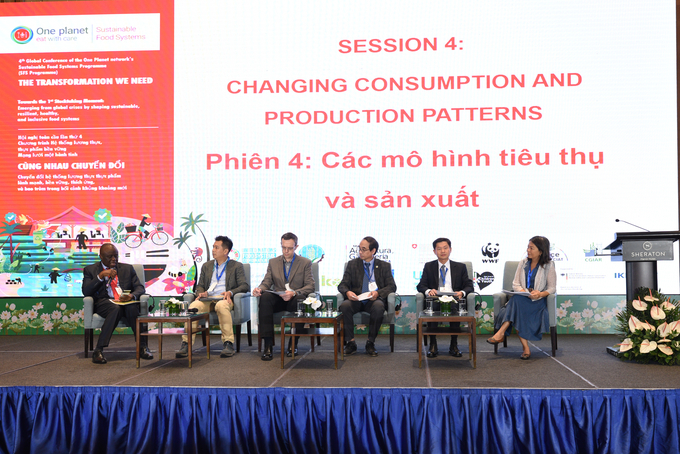
The fourth discussion session has the theme "Consumption and production patterns". Photo: Tung Dinh.
Particularly in terms of impacts on human health, at present, 1 in 3 people is overweight or obese, 1 in 12 people suffers from undernourishment or malnutrition. The global mortality rate shows no sign of improving. To date, no country has been on course to meet the 2025 global nutrition targets.
“The puzzles of food production and consumption need to be integrated between each community in order to solve problems related to climate change, biodiversity loss and health declines. It is a global challenge,” said the WWF representative.
To provide solutions to the puzzle pieces of the food system at the local level, Dr. Rebecca Shaw introduced the "Five I-s" mindset, including: Information - Institutions (agencies joining hands to solve problems together) - Integration (coordination between many parties such as agencies, departments and communities) - Inclusion (coordination between relevant departments) - Inspiration (motivation, inspiration to ignite the spirit of scientists and experts in the field to change the food production and consumption patterns).
On this occasion, Dr. Rebecca Shaw sent a message: “WWF encourages you to become wise consumers, establish appropriate diets to ensure a sustainable food system”.
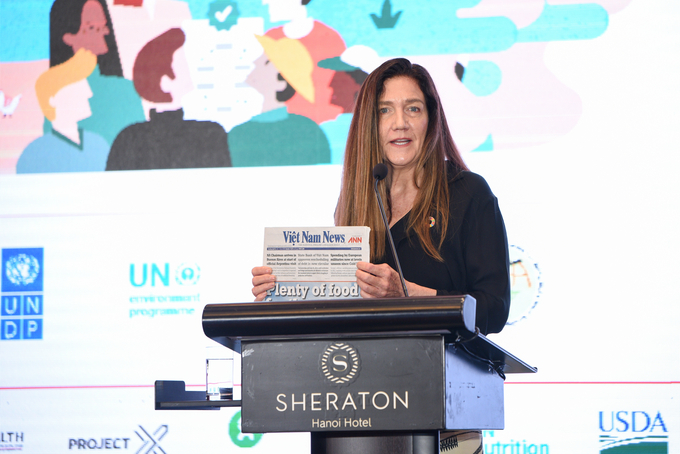
Dr. Rebecca Shaw said that the food system has notable impacts on addressing climate change, biodiversity loss and health declines. Photo: Tung Dinh.
Sharing comments at the discussion session, Dr. Dao The Anh, Vice President of Vietnamese Academy of Agricultural Sciences (VAAS), said that Vietnam is an agro-product exporter, but at the same time this country imports a lot of raw materials for processing in service of export. Vietnam still faces ample challenges of malnutrition in the highlands and obesity in the city. Vietnam's intensive agriculture has also caused certain effects such as soil pollution, water pollution.
From the perspective of a scientist, Dr. Dao The Anh believes that the approach to the food safety system requires the participation of relevant departments, domestic and international organizations, as well as non-governmental organizations. “Through research and trials, we present reports and evidence in an attempt to convince countries that inclusive approaches to a sustainable food system is a very important goal. Vietnam has held a number of consultation sessions to be able to mobilize the contributions of stakeholders”.
The Government of Vietnam has recently issued an Action Plan to transform a transparent, accountable and sustainable food system. Reality has shown that the food system requires two main factors: knowledge and innovation. “We need to support smallholder farmers who are facing many difficulties, providing them with advice on scientific models as well as inputs. Vietnam urgently requires the support of all international organizations to share experiences in this regard," said the VAAS Vice President.
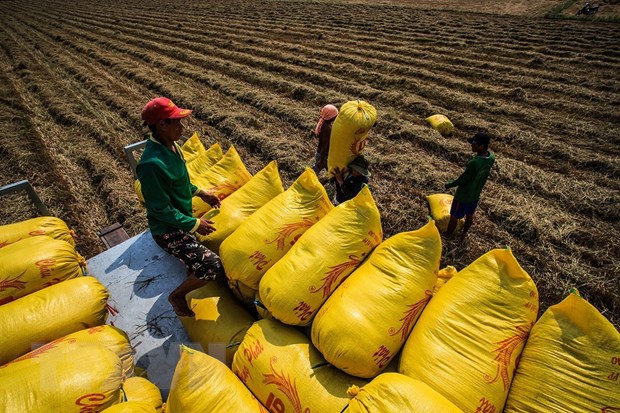
Large-scale farming holds an important role in the agriculture industry but also causes great impacts on the environment, namely greenhouse gas emissions.
Regarding Cambodia's experience in solving difficulties in building a sustainable food production system, the Secretary General of the Council of Agriculture and Rural Development (CARD), Office of the Council of Ministers of Cambodia, Mr. Sok Silo said that Cambodia tackles major problems through the policies of the State, national strategies as well as the restructuring strategy of the agricultural sector.
“Providing measures to solve problems related to social order, security, and healthy nutrition system requires the very important role of the government. In addition, new mindset on transforming the food processing system calls for changes from other systems in society,” said Mr. Sok Silo.
According to Mr. Robert Cole, Regional Advisor on Responsible Agricultural Investment, Mekong Region Land Governance project, the global agricultural production trend at present is to accumulate land, ensure large-scale production to apply mechanization and use pesticides more effectively. “Large-scale farming holds an important position in the agricultural industry but also causes great impacts on the environment, namely greenhouse gas emissions. In that context, the role of small-scale farmer models is equally important”.
According to Mr. Ply Pirom, Project Manager Sustainable Consumption and Production, WWF-Thailand, protection of environmental resources is one of the important factors to build a sustainable food system. The principle the world should head towards is to protect health and bring economic benefits to farmers.
Mr. Sok Silo said that in order to address the big challenges in transforming the current food consumption system, countries and organizations need to call for the participation of businesses to optimize costs and improve product quality. “The focus should be on changing social mindset, enhancing agricultural modernization, ensuring nutrition security and adapting to climate change”.
Translated by Samuel Pham
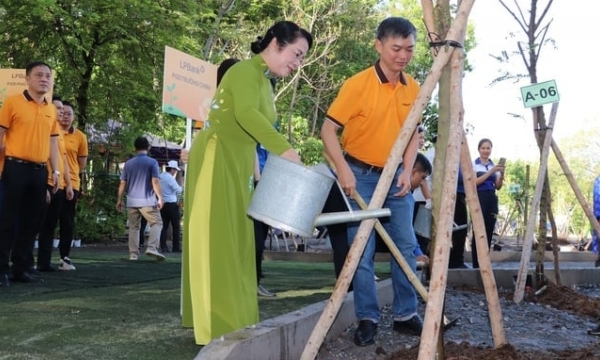
(VAN) Planting and expanding green spaces is a crucial effort to mitigate and adapt to the impacts of climate change, thereby creating a clean and livable environment.
/2024/05/17/5720-1-134847_782.jpg)
(VAN) EcoTraceTech - System for measuring CO2 and CH4 emissions from rice plants is the startup idea of a group of Can Tho University students.
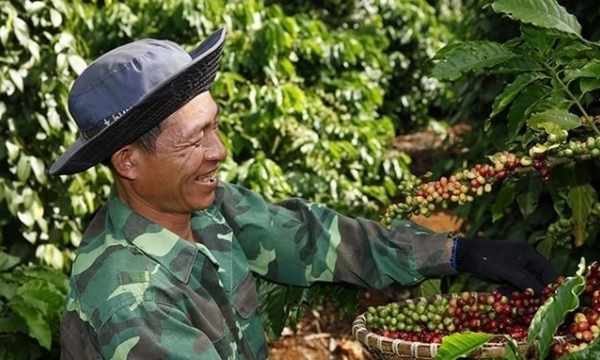
(VAN) The NESCAFÉ Plan by Nestlé Vietnam in the Central Highlands together with MARD aims to support coffee farmers in regenerative agriculture.
/2024/05/16/4437-1-223910_491.jpg)
(VAN) The Community Food Garden model is one of the outstanding activities and models of green transformation in the world as well as in Vietnam.
/2024/05/16/2455-1-111202_165.jpg)
(VAN) Artemia eggs originating in Vinh Chau (Bac Lieu) are assessed by customers to have the best quality in the world; however, domestic production output only accounts for 1%.
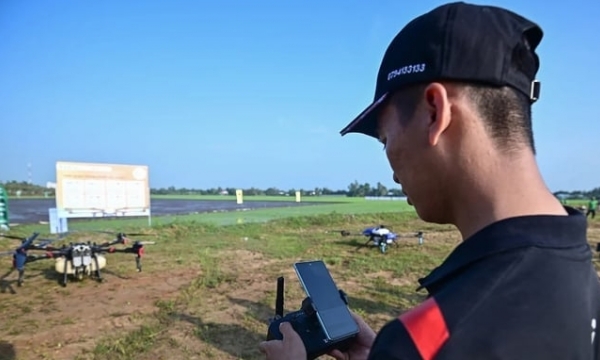
(VAN) Deputy Permanent Chairman of the National Committee for Digital Transformation Tran Luu Quang chaired the symposium on 'Promoting digital transformation of agriculture,' held on May 14.
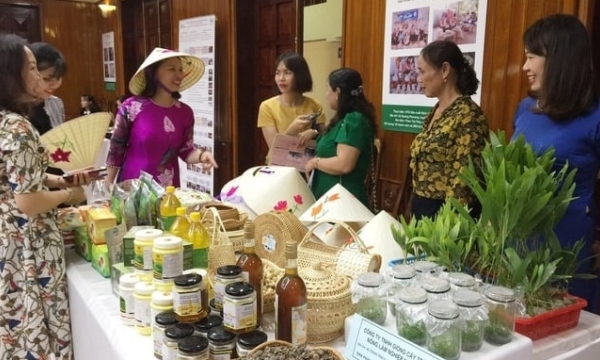
(VAN) After seven years of implementation, the Commercial Smallholder Support Project (CSSP) successfully aided numerous local households in escaping poverty, with multiple infrastructure projects initiated across Bac Kan province.